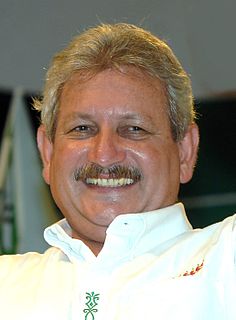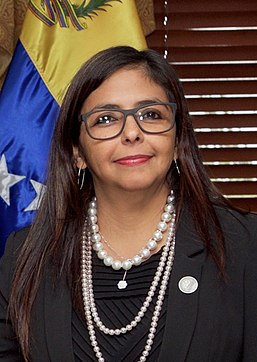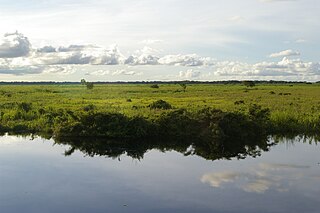
The politics of Bolivia takes place in a framework of a presidential representative democratic republic, whereby the president is head of state, head of government and head of a diverse multi-party system. Executive power is exercised by the government. Legislative power is vested in both the government and the two chambers of parliament. Both the Judiciary and the electoral branch are independent of the executive and the legislature. After the 2014 election, 53.1% of the seats in national parliament were held by women, a higher proportion of women than that of the population.

Elections in Bolivia gives information on elections and election results in Bolivia.

The Movement Without Fear is a progressive political party in Bolivia. MSM was founded on March 1, 1999.

The current Constitution of Bolivia came into effect on February 7, 2009 when it was promulgated by President Evo Morales. after being approved in a referendum with 90.24% participation. The referendum was held on January 25, 2009, and the constitution was approved by 61.43% of voters.

Rubén Armando Costas Aguilera is a Bolivian politician and the current governor of Bolivia's Santa Cruz department for the Truth and Social Democracy (VERDES) party. In 2013, he founded the Social Democrat Movement party to participate in the 2014 presidential and parliamentary election. Previously he served as prefect on behalf of the Autonomy for Bolivia party. He was one of the nine Bolivian prefects directly elected in the general elections of 2005. This election was the result of several negotiations and large, peaceful public demonstrations in Santa Cruz. The 1967 Bolivian constitution said that prefects can only be appointed by the president, but because of the negotiations and popular desire, the Bolivian Congress approved Law 3015 to formalize the prefect election process.
Social unrest in Cochabamba involved violent clashes between supporters and opponents of Cochabamba Prefect Manfred Reyes Villa in the departmental capital city of Cochabamba, Bolivia, reaching their peak on January 11 and 12, 2007. The policies of the President Evo Morales and the agenda of his Movement towards Socialism (MAS) party in the Constituent Assembly were opposed by politicians in other political parties, notably Reyes Villa. The prefect's opposition to Morales' policies angered the President's supporters, and early in 2007 demonstrations in Cochabamba escalated into violent clashes between Reyes Villa's civic movement and urban and rural social movements who called for his ouster. During the violence, coca farmer Juan Tica Colque and the young student Christian Urresti (17) were killed. Coca farmer Luciano Colque (48) was mortally wounded by blows from civic movement protesters and died of cranial trauma on February 27. Some 200 people were wounded in the clashes.
The Ecuadorian Constituent Assembly was a 2007–2008 constitutional assembly in Ecuador, which drafted the 2008 Constitution of Ecuador, approved via the Ecuadorian constitutional referendum, 2008.

The Media Luna or Media Luna Ampliada refers to a group of four departments – Santa Cruz, Beni, Pando, and Tarija – in Bolivia which became the geographic area of opposition to the national government led by Evo Morales and the Movement for Socialism (MAS).

The Bolivian Constituent Assembly, convened on August 6, 2006 in Sucre, with the purpose of drafting a new national constitution by December 14, 2007; extended from the original deadline of August 6, 2007. The Assembly approved the new Political Constitution of the State on 9 December 2007. It was put to a national referendum held on 25 January 2009, and went into force on 7 February 2009.
Events from the year 2007 in Bolivia

The following outline is provided as an overview of and topical guide to Bolivia:

A referendum to approve the autonomy statute of Santa Cruz Department of Bolivia was held on 4 May 2008. The vote resulted from strains between the Prefecture of Santa Cruz and President Evo Morales. The referendum was declared illegal and unconstitutional by the National Electoral Court. Final results from the referendum showed that 85.6% of participating voters supported autonomy. Abstention rates were 37.9%. Partisans of the Movement for Socialism called for a boycott of the vote, and the Guarayo, Guaraní, Chiquitano, Ayoreo, Yuracaré-Moxeño indigenous peoples were urged to reject holding the vote in their territories.

A vote of confidence in President Evo Morales in the form of a referendum was held in Bolivia on 10 August 2008. The vote was held to determine whether Morales, Vice President Álvaro García Linera, and eight out of nine departmental Prefects should stay in office. Morales received more than 67% support and six of the eight prefects were returned. The prefects of Cochabamba Department and La Paz Department were defeated and had to face re-election.

Referendums on departmental autonomy statutes were held in four departments of Bolivia—Beni, Pando, Santa Cruz, and Tarija—in May and June 2008. These four departments, known as the Media Luna, voted in favor of autonomy in the June 2006 elections. The National Electoral Court had blocked the referendums, along with the proposed referendum on Morales's new constitution. The referendums were also unconstitutional, as the constitution in force at the time had no provisions for departmental autonomy. Under the Framework Law on Autonomy, passed in 2010, the autonomy statutes must be harmonized with the 2009 Constitution before being enacted.

The domestic policy of the Evo Morales administration refers to the domestic policy initiatives of the current President of Bolivia, including past pre-presidential advocacies by Morales.

Bolivia has had seventeen constitutions, including the present one, since its foundation in 1825.

The Presidency of Evo Morales began on January 22, 2006 when Evo Morales was inaugurated as the 80th President of Bolivia, following his victory in the 2005 general election, where he won 53.7% of the vote, defeating Jorge Quiroga, Samuel Doria Medina, and several other candidates. Morales increased taxation on the hydrocarbon industry to bolster social spending, emphasising projects to combat illiteracy, poverty, racism, and sexism. Vocally criticizing neoliberalism and reducing Bolivia's dependence on the World Bank and International Monetary Fund, his administration oversaw strong economic growth while following a policy termed "Evonomics" which sought to move from a liberal economic approach to a mixed economy. Scaling back U.S. influence in the country, he built relationships with leftist governments in the Latin American pink tide and signed Bolivia into the Bolivarian Alliance for the Americas. Attempting to moderate the left-indigenous activist community, his administration also opposed the right-wing autonomist demands of Bolivia's eastern provinces. Winning a recall referendum in 2008, he instituted a new constitution that established Bolivia as a plurinational state and was re-elected in 2009. His second term witnessed the continuation of leftist policies and Bolivia's joining of the Bank of the South and Community of Latin American and Caribbean States; he was again reelected in the 2014 general election.

A constitutional referendum was held in Bolivia on Sunday, 21 February 2016. The proposed constitutional amendments would have allowed the president and vice president to run for a third consecutive term under the 2009 Constitution. The referendum was voted down by a 51.3% majority.

Constituent Assembly elections were held in Venezuela on 30 July 2017 to elect the members of the 2017 Constituent National Assembly Unlike the 1999 Constituent National Assembly, which was assembled following a referendum, the 2017 election was unconstitutionally convened by the presidential decree of President Nicolás Maduro.


















